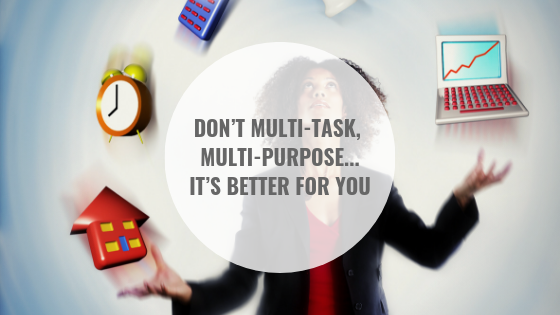Julie Entwistle, MBA, BHSc (OT), BSc (Health / Gerontology)
Like the word “busy”, the words “multi-task” had a few years of being “cool”. People thought that “multi-tasking” was accomplishing more, being super-hero productive, and showing superior intellectual capacity. But research into multi-tasking has proven the opposite and in fact, our brains are not able to multi-task at all. In fact, trying to do two things at once is reducing our capability to manage either effectively.
In the article “12 Reasons to Stop Multi-Tasking Now” it is highlighted that society has moved towards the implication that if you are not doing two things at once, you are wasting time. It mentions the reasons to stop multi-tasking, including some important points like: “Moving back and forth between several tasks actually wastes productivity…because your attention is expended on the act of switching gears—plus, you never get fully “in the zone” for either activity”. This causes activities to take “more time” so instead of both taking say 10 minutes each, together they take you 25. Further, we miss things by trying to do too much. Our skills become careless, or it reduces our ability to enjoy moments if we are texting and walking or emailing while also trying to watch the ballet recital. Attending to two things at once actually drains our “working memory” which kills our creativity. There is just not an upside.
My solution is something I call “multi-purpose”. It is the way I try to spend my time when it makes sense to fit in multiple things. But I apply this to chores and tasks at home, more than work. For example, if I am out to get X, I will also survey my home and “to do list” to see if I can also do Y in the same errand. Our orthodontist is beside the bike shop and seamstress, so every trip to get braces tightened also means pants with holes or bikes with slow leaks are also addressed. The pet store is beside the Goodwill, so when the cats need food the donation bag in the garage is dropped off. The grocery store is beside my favorite gas station, so stopping for one usually means stopping for the other. With work, I, of course, try to book client visits that are nearby, and if I have time in between I want to know that I can stop at a coffee shop with my laptop for some charting (means I need to plan for this and bring my laptop with me). I also bring a lunch, as stopping to eat (in my opinion) doesn’t benefit my time, wallet or waistband. I may or may not return calls in the car (hands-free of course) – it depends on whether my brain (or heart) just needs to “reflect and drive” or the urgency of the call. Bottom line is that I don’t tend to go places without thinking “what else can I accomplish during this outing and how can my time be best spent?” The things that fill my day tend to serve many purposes, but they are still done separately. That is the art of multi-purpose without the troubles and inefficiencies of the misleading concept of “multi-tasking”.

